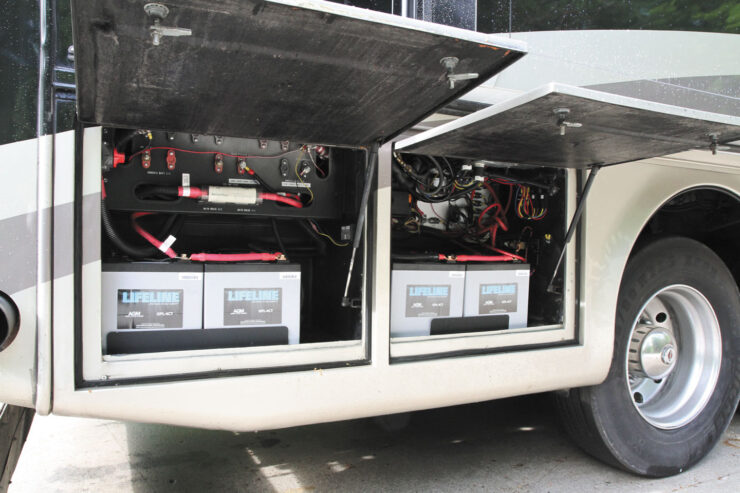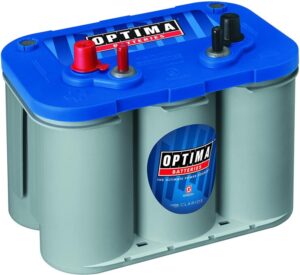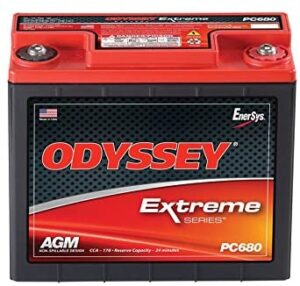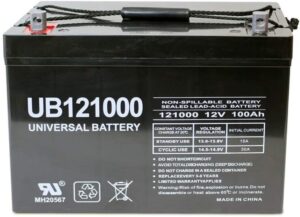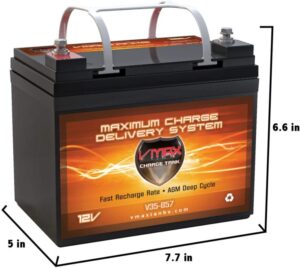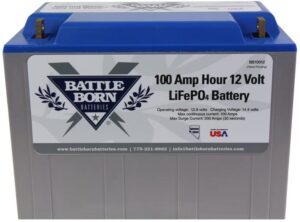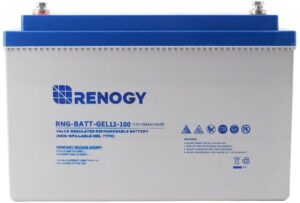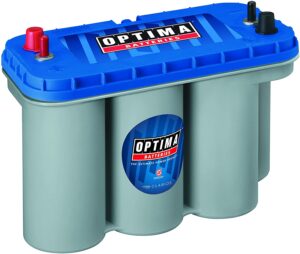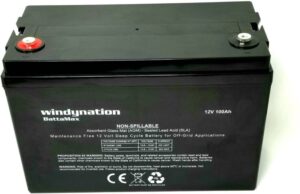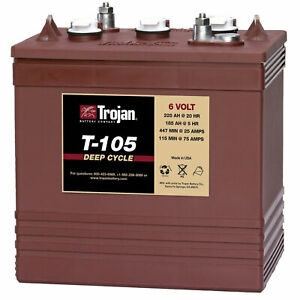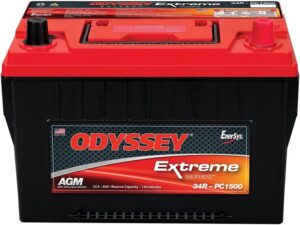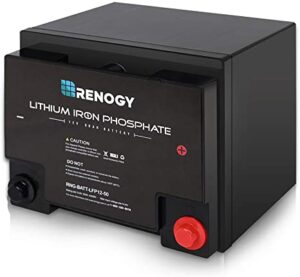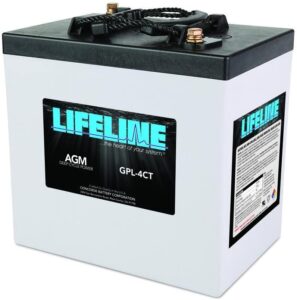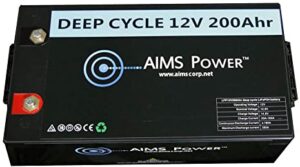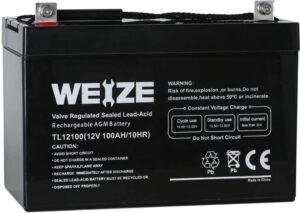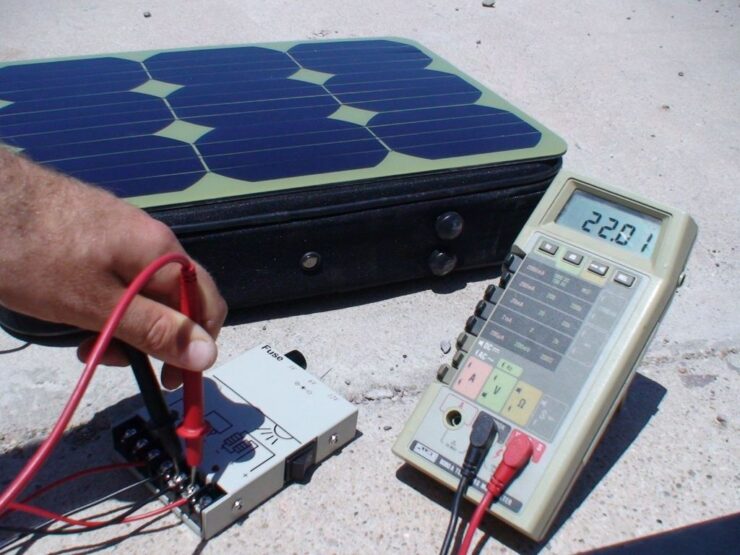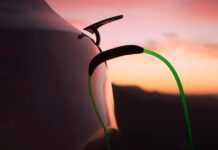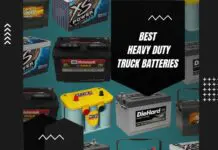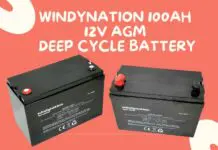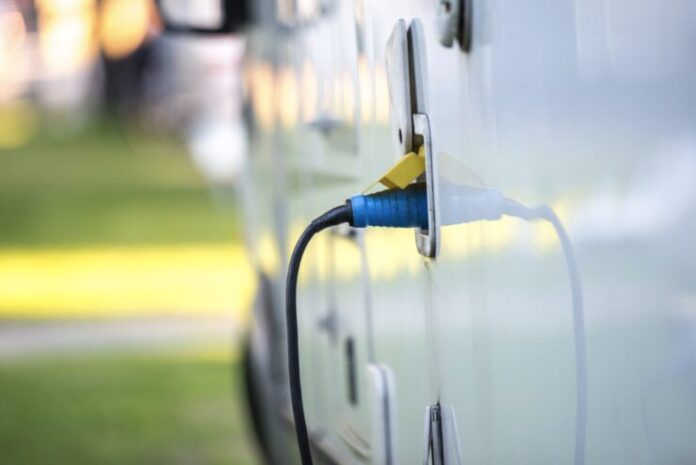
Recreational vehicles are amazing vehicles that bring together the comforts of a home and a car together. There are a lot of types to choose from. RVs come in all sizes, from small trailers to large mobile homes.
[amazon table=”575″]Power requirements of the RV is a major concern to take care of when you invest in an RV. Picking the Best RV Deep Cycle Battery can be a daunting task and we understand that. Hopefully, this article will familiarize you with everything you need to know before you buy an RV or a battery for your RV.
Why do you need a different battery for an RV?
RVs are tricky vehicles. They have high power requirements and they have quite different features than regular vehicles. Different strategies need to be implemented to create a proper battery system for an RV. Cars mostly need good cranking power but in RVs, the priorities are different.
With good cranking, you also need a good battery that is powerful enough to power your electronics. There are various ways of meeting the power requirements an RV might have and we will be discussing them in detail in a while.
Cars generally don’t have a lot of electronics. Ideally, it is recommended that you compartmentalize the necessities and get a different battery for different purposes. This article will help you understand the needs of a modern RV in detail and we will also discuss the different components that you need in addition to your battery in an RV and how to set everything up. So keep reading.
Before you continue with the different technical details you need to look out for while buying yourself a battery for your RV, let us look at some amazing options available in the market that can fit your RV greatly.
While discussing the products, we will also discuss how that particular battery should be used in your RV so we have something for everyone. If you are completely new to this, go ahead and read the latter sections first and then come have a look at the list for a better understanding.
15 Best Deep Cycle Batteries for RV
1. Optima Batteries 8016-103 D34M BlueTop Deep Cycle Marine Battery
If you’re looking for a one-stop solution for all your RV requirements, the Optima BlueTop is an amazing choice for you. This battery was designed to be a dual purpose battery for marine vehicles, but amazingly enough, it works just fine even with an RV.
Dual purpose batteries have both decent deep cycle capacity and cranking power. In an RV, that could be a huge advantage. You can fulfill all requirements using a single product instead of having to look for different batteries for cranking and electronics.
The Optima BlueTop 8016-103 D34M is one of the most powerful batteries in the line with a 750 CCA cranking power accompanied by 120 minutes of reserve capacity. This makes the battery a decent choice for most cranking needs. Additionally, the battery also comes with a deep cycle capacity of 55Ah.
Optima batteries are known for their amazing AGM technology. They have spiral cell technology that allows better performance. The battery also comes with a 36-month warranty when bought from an authorized dealer. For best results, we recommend that you use multiple batteries in parallel for your electronics and have a separate BlueTop for cranking. This will help you keep track of your batteries and perform better maintenance.
Read More about Optima BlueTop 8016-103
Pros
- 750 CCA cranking power.
- 120 minutes of reserve capacity.
- 55Ah capacity.
- AGM technology.
- 36 months warranty.
Cons
- Somewhat expensive.
- Not the best in terms of deep cycling.
2. PC680 Deep Cycle Battery
If you’re looking for a small battery that you can buy in a fair quantity, to build a powerful battery back. The Odyssey PC680 could be a good option for you. Odyssey is known for making durable batteries based on advanced AGM technology.
The PC680 features a 170 CCA of cranking power and 24 minutes of reserve capacity. The battery is also accompanied by 16Ah of deep cycle capacity. The battery may not be a powerful battery on its own but is great for creating a battery bank. You can have six of these batteries connected in parallel to have a decent battery system. However, it may not be the best option for very heavy uses.
The battery is built using AGM technology. This makes the battery extremely durable and vibration resistant and can be a great companion on rough roads. The battery is also vary compact and can be mounted in different positions without worrying about spillage as the battery is completely sealed. The battery is not the best for cranking for an RV so you may not want to use it for that.
It can be a very good battery for very small trailers however if you’re on a budget.
Pros
- 170 CCA cranking power.
- 16Ah capacity.
- AGM technology.
- Affordable
- Maintenance-free.
Cons
- Poor cranking power.
- Unsuitable for very heavy applications.
3. Universal Power Group 12V 100Ah AGM Deep Cycle Battery
When it comes to deep cycling, Universal makes some of the eBay products in the market. This battery rated at 100Ah is perfect for heavy RVs. You can connect multiple of these in parallel to get an even higher capacity. What’s more, is that the battery is also very durable and transportable. The battery is built using AGM technology and is thus essentially maintenance free.
If you don’t need more power and the 100Ah rating is enough for you, the battery would still be a good choice and the battery is very affordable and has very good performance. The battery has excellent reviews and has proved itself well enough.
The battery performs exceptionally well with a solar charging setup. Using proper methods and accessories, this battery can be a great investment. The battery can be mounted in any position and is thus a good option if space is an issue. The battery also comes with a 1-year warranty for added reliability.
However, one issue with the battery is that this battery has very poor cranking power so it is not fit for the engine of your RV. The best use of this battery would be to be used as a deep cycle battery to power the various electronics in your RV.
Read more about Universal Power Group 12V 100Ah Deep Cycle Battery
Pros
- 100Ah capacity.
- AGM technology.
- Maintenance free.
- Vibration resistant and spill proof.
- Affordable.
Cons
- Bulky.
- Poor cranking power.
4. VMAXTANKS VMAX V35-857 12 Volt 35AH AGM Battery
If space is an issue for you, this battery is undoubtedly one of the eBay batteries for you. Rated at a 35Ah, this battery is perfect for lightweight applications as well as a unit for a powerful battery bank.
The battery is inexpensive and provides great performance. Designed originally for marine vehicles, this battery has found its use in the RV industry too, thanks to its compact size and great performance. The battery is based on a sealed AGM technology. The battery is easy to maintain and can be charged without much hassle.
Built around AGM technology, just like the previous batteries on our list, this battery is completely maintenance-free and spill-proof. The battery however is not suitable for cranking and is only good for powering electronics.
The standalone battery may be a bit weak for most cases but a battery bank made of these batteries wulf be really powerful and durable. This battery is best used as a deep cycle battery for small RVs.
Pros
- 35Ah capacity.
- AGM technology.
- Maintenance free.
- Compact size.
- Affordable.
Cons
- Unfit for heavy applications.
- Poor cranking power.
5. Battle Born LiFePO4 Deep Cycle Battery
If you’re not particularly excited by AGM batteries, you can also give this battery a try. This battery is based on Li-Ion technology, unlike the precious batteries on our list. Li-Ion is an emerging technology and most electric cars now use Li-Ion batteries.
The battery just like AGM batteries is completely sealed and maintenance-free. The battery is much safer to use than AGM batteries and has great battery life. Rated at 100Ah, this battery is equally powerful as most of the batteries on our list but what makes it stand out is the built-in BMS. Li-Ion batteries need a BMS in order to control the charging and discharging of the battery. The built-in BMS makes the battery very easy to use with other batteries of the same type.
However, you may not want to use this battery as a cranking battery because the output current is pretty standard.
Read more about Battle Born Deep Cycle Battery
Pros
- 100Ah battery.
- Li-Ion technology.
- Builtin BMS.
- Maintenance free.
- Lightweight.
Cons
- Relatively more expensive.
- Needs special equipment for charging.
6. Renogy 12V 200Ah Rechargeable Deep Cycle Pure Gel Battery
This battery is rated at a whopping 200Ah and is best for RVs that need a lot of power or need to work in harsh weather conditions. The gel type battery is amazing in terms of performance and can work flawlessly even in terrible weather.
The battery is also very safe to use and can be used in trying conditions. The battery is completely leak proof and sealed and also does not require any maintenance. The battery can however be a bit more expensive than some of its AGM counterparts.
Read more about Renogy Deep Cycle Battery
Pros
- Gel technology.
- 200Ah capacity.
- Maintenance free.
- Spill proof.
- Durable.
Cons
- Can be unfit for small applications.
- Moderately expensive.
7. Optima Batteries 8052-161 D31M BlueTop Starting and Deep Cycle Battery
Another installment from the BlueTop series, this battery is more powerful than the last BlueTop battery on our list. The battery has a whopping 900CCA of cranking power along with a reserve capacity of 55 minutes.
You can easily use this battery as a starting battery for your RV as well as have a set of these batteries to use as a battery bank for powering the electronics in your RV.
Just like the last Optima battery on the list, this battery comes with a spiral cell technology that allows better performance. The battery also comes with a 36 month warranty when bought from an authorised dealer. For best results, we recommend that you use multiple batteries in parallel for your electronics and have a separate BlueTop for cranking. This will help you keep track of your batteries and perform better maintenance.
Pros
- 900 CCA of cranking power.
- 55 minutes of reserve capacity.
- AGM technology.
- Dual purpose.
- Maintenance-free.
Cons
- Not the best deep cycling power.
- Heavy setups can get expensive.
8. WindyNation 100AH 12 Volt AGM Deep Cycle Battery
One of the most versatile products on the list, this 100Ah battery gives you complete control over your entire setup. The battery, you can argue, is like any other AGM deep cycle battery and to an extent, you’d be right. It has pretty much the same features as some of the other batteries on our list. WindyNation is known for its amazing batteries and is almost a very famous brand in the space.
The battery is an AGM battery and is loaded with all the features of a good AGM battery. However, the battery also has a benefit for a financial standpoint. The company offers a lot of choices for you to choose from and discounts when you buy in bulk. If you are planning on creating a heavy setup, consider using these batteries to save some money while retaining the same amazing quality.
Read more about WindyNation Deep Cycle Battery
Pros
- 100Ah rating.
- Affordable.
- AGM technology.
- Maintenance free.
- Offers on bulk purchases.
Cons
- Not good for cranking.
- No handles for transportation.
9. TROJAN BATTERY T-105 PLUS 6V DEEP CYCLE FLOODED 225 Ah.
If you need to get a powerful setup at a fairly low price, you can definitely give these batteries a shot. We know what you’re wondering. These are flooded batteries. Yes. But they are extremely durable and their performance is excellent. So we’ll make an expectation and advise you to give them a chance. However remember that they will not have a very good vibration resistance and spillage might cause an issue.
Other than that, the batteries are rated at a whopping 225Ah and are extremely powerful. You must buy a pack of 4 which you can then attach in various configurations to get your desired output.
Pros
- 225Ah rating.
- Affordable.
- Easy transportation.
- Good for stationary systems.
Cons
- No vibration resistance.
- Flooded battery.
10. Odyssey PC925 Automotive and LTV Battery
Yet another product platform Odyssey, the PC 925 stores slightly more power than the last product on our list. This battery is also based around the AGM technology and provides excellent performance.
Featuring a 330 CCA cranking power and 48 minutes of reserve capacity, this battery is a good option for you if you’re looking for a battery for your travel trailer. The battery has high vibration resistance that makes the battery rally heavy duty. The Battery has an exceptionally long battery life and comes with a 3-4 year warranty upon purchase.
Pros
- 330 CCA of cranking power.
- 48 reserve minutes.
- AGM technology.
- Maintenance free.
- Spill proof design
Cons
- Not excellent as a standalone battery.
- Setups can be expensive.
11. NP6-225Ah 6V 225Ah AGM Deep Cycle Battery Camper Golf Cart RV Boat Solar Wind Power
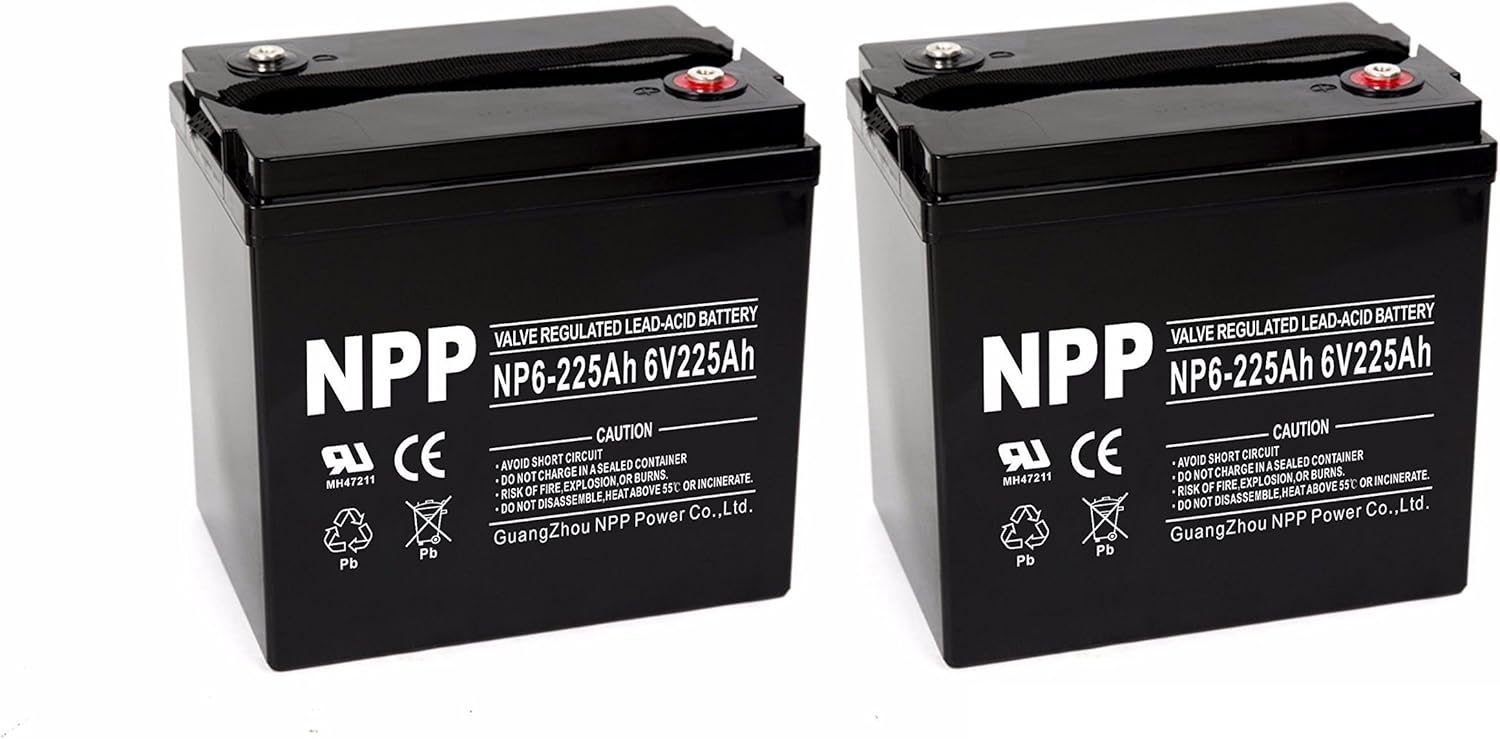
Another combo pack, this set of 2 batteries, each rated at 6V and 225Ah is the perfect fit for any powerful setup. The batteries are based on AGM technology so durability and a maintenance free nature is a given. Apart from that, the batteries are very compact which is always a good thing to have.
The batteries can be mounted in any position without spillage. As a token of reliability, the batteries also come with a 30 day money back guarantee.
Pros
- 225 ah rating.
- Pack of 2.
- AGM technology.
- Compact.
- Maintenance free.
Cons
- Can be an overkill in some cases.
- Bit expensive.
12. Renogy Lithium-Iron Phosphate Battery 12 Volt 100Ah for RV, Solar, Marine, and Off-grid Applications
Another product from Renogy, this Li-Ion battery works excessively well in RVs when coupled with solar panels and charge controllers. If you plan on going on dry camping or similar situations, this can be a good battery for you.
You can easily connect multiple of these batteries in series to increase the capacity accordingly. However, it is recommended to not connect the battery in series.
The battery comes with a builtin BMS that monitors the status of the battery at all times and controls the charging and the discharging of the battery. The battery has a great battery life and assures up to 2000 cycles of discharge.
Pros
- 100 Ah rating.
- Li-Ion technology.
- 2000 discharge cycles.
- Maintenance free.
- Easy to manage.
Cons
- Not good for cranking.
- Cannot be connected in series.
This 6V battery is a great choice for you if you want more power packed in a small space. The battery can discharge currents up to 25A and has a capacity of 220Ah.
The battery can be paired up with a similar battery in series to get a total of 12V at 220Ah. If your engine isn’t very demanding, chances are you can use this battery to try and crank your engine but again, you’ll need two of these so that’s not really a good idea.
The battery is sold as a deep cycle battery and using it for intended uses can be a good idea. The battery is based on an AGM technology just like the other sealed lead acid batteries on our list and hence offers great vibration resistance and durability.
Pros
- 220Ah rating.
- Affordable.
- AGM technology.
- Maintenance free.
- Spill proof and vibration resistant.
Cons
- Not good for cranking.
- Managing complex battery systems can be difficult.
14. AIMS Power LFP12V200A Black 12V Lithium Battery 200Ah
If you’re looking for an extremely powerful battery that’ll last you a lifetime, you may consider this battery. Rated at 200Ah, this battery assures almost 4000 discharge cycles.
The feature about this battery that completely stands out is that it assures more than 10 years of service life. Being a Li-Ion battery, this battery is capable of working flawlessly even in harsh weather conditions. The battery also comes with an advanced BMS that takes care of a lot of issues like short circuit protection, over and undercharge protection, etc. The battery is also very useful for cranking as the battery is able to discharge a current of upto 350A for 10 seconds.
The only issue with the battery in spite of its amazing features is that the battery costs a lot and can be unaffordable to some users. However, if you have money to spare, this battery can really be a good investment. The battery even comes with a 3 year warranty for added reliability.
Pros
- 200Ah rating.
- Maintenance free.
- Li-Ion technology.
- Builtin BMS.
- 4000 discharge cycles.
Cons
- Very expensive.
- Not the best durability.
15. Weize 12V 100AH Deep Cycle AGM SLA VRLA Battery for Solar System RV Camping Trolling Motor, in Series 24V 36V 48V
Just like a few other batteries on our list, this battery is also rated at a 100Ah, the battery is AGM type battery and this features all the amazing features of an AGM battery. This battery is best suited for applications where you need a higher voltage. A number of these batteries can be connected in series to achieve a high voltage at a 100Ah rating.
Multiple such networks can be made in order to get a higher capacity. The battery has amazing durability and spill-proof technology. The battery can be a good option for travel trailers that need to face rough terrain.
Pros
- 100Ah rating.
- AGM technology.
- Spill-proof design.
- Maintenance free.
- Affordable.
Cons
- Bulky.
- No fast charging.
What is an RV Battery?
Now that you’ve seen a list of some of the best RV batteries in the market, you may be wondering what an RV battery should actually be like. Well, say no more. In coming sections, we will discuss the different types of RV batteries and what you should look for in an RV battery.
Need for the Best RV Deep Cycle Battery?
The need for batteries in an RV can be divided into two sections. Let us look at what these sections are and understand what kind of battery we need for each.
Powering the Electronics
The first part is the Recreational Vehicle itself. An RV is supposed to function as a small, mobile home. As such, it is only obvious that it will have a lot of electronics inside. To power these electronics, you need a power source. The need for power in an RV is fulfilled by using deep cycle batteries.
Deep cycle batteries are designed to slowly discharge over a long period of time, unlike your car battery. We will further discuss deep cycle batteries and their different types in the next section. The capacity of deep cycle batteries are generally measured in Amp-Hours.
Usually, RVs have a higher deep cycling requirement than regular cars. Hence, they need batteries with higher capacities. The good thing is, RVs generally have a lot of space to spare and thus a lot of batteries can be used to fulfill the power requirements. This can be done in two ways.
RV electronics are designed to be able to extract power from a 12V DC source. This can be done by using high capacity 2.1V batteries and connecting them in series to get a resultant voltage of 12.6 V. This option is implemented by a lot of users as you can get much higher capacity since the 2.1V batteries are generally rated at very high capacities.
Note that adding batteries in series does not increase the overall capacity and the capacity of the connected battery setup will be equal to the capacity of a single battery. Apart from 2.1V batteries, you can also use 6V batteries and use two of them to get a 12V battery.
The second option is to use multiple 12V batteries connected in parallel. Parallel connections do not increase the battery voltage but they cause the individual capacities of the batteries in the network to add up. The key to getting the right battery for your RV if you are looking to make a battery bank for your RV using multiple 12V batteries is to keep in mind the cost and size of each battery as they can be bulky and with higher capacity, the size only goes up.
A good way to find the best battery for powering electronics in your RV is to first calculate the electricity requirements in your RV and then find the best arrangement possible. This makes the overall process much simpler and makes sure you do not waste additional money and getting something that is clearly overkill.
Powering the Engine
The second power requirement of the RV is the power required by the engine itself. The engine is supposed to create power but the engine needs power itself to start. You may have seen most engines in devices and small generators being cranked by hand. In cars, the same effect is achieved electronically. A battery is used to start a motor that in turn cranks the engine. In smaller cars, this battery also needs to power the electronics inside the car before the engine starts. But at least you need not worry about this in RVs because it is very likely that you will be using a different set of batteries anyway.
Once the engine starts, the engine performs its task of moving the car as well as taking over the electricity requirements(in small vehicles like cars) while charging the battery simultaneously. For the battery, this means that the battery does not need to last long after a single charge. Batteries meant for cranking or starting batteries are designed to have lower capacity but high discharging rates.
This is because a lot of power is required to crank an engine. This can depend on a lot of factors. Bigger engines are generally harder to crank and thus they need more powerful batteries. Additionally, engines are also very sensitive to the temperature and altitude of the area.
Hence to make sure you get the right battery for your car, you must make sure that you understand the power requirements of your engine. The cranking power of a starting battery is measured in CCA or Cold Cranking Amps. We will talk more about battery types in detail in the next section.
It must be evident to you not that there is no single almighty battery for your RV. In fact, you should compartmentalize your power requirements and find the b best options for each section one by one.
To revisit the important points, remember:
- You need deep cycling power for electronics.
- You need cranking power for engines.
Types of RV Batteries
RVs are quite different from other vehicles. Other vehicles Like jeep wrangler can work just fine with a single type of battery whereas RVs need a mix of two different types of batteries to perform two very different functions.
Ideally, you’d want to use different batteries for the two different requirements as discussed above but these days people are also considering using dual-purpose batteries. In this section, we’re gonna look into the different types of batteries in the market so you can have a better understanding of batteries when you buy one for yourself.
Batteries for vehicles come in different shapes and sizes. Smaller, cheaper batteries usually have a lower capacity whereas bigger, heavier batteries tend to have more capacity. You may not have to worry about space if you have a decent RV but it’s still a good idea to look at all possible combinations to find the best deal possible.
Watch the following video and learn more about different RV battery types:
Let’s talk a bit about the different types of battery now.
Deep cycle battery
Deep cycle batteries are used when you need steady current for a longer period of time. You may have seen and used different deep cycle batteries in your home UPS, inverters, etc. Even the batteries in our phones and laptops are examples of deep cycle batteries. They get their name from the feature that they display.
The deep cycle batteries can handle discharges up to 80% and can still be brought back to life. Most deep cycle batteries can function normally up to 50% discharge or even more. This is called the depth of discharge. Ideally, a battery with a higher depth of discharge is more efficient. Anywhere between 50%-80% is an acceptable value.
Some batteries even boast that they can handle upto 100% depth of discharge. While that is often true too, it is recommended that you do not discharge your battery so deeply as it may greatly affect the battery life.
Most deep cycle batteries are meant for purposes with low power needs such as electronics. They are not for high-power applications like cranking, etc. as they cannot output a high1` current when required. They have a very low discharging speed that makes them unsuitable for such purposes.
The capacity of deep cycle batteries are measured in Amp-Hours. By definition, 1 Ah equals a current draw of 1A per hour. 100 AH is a standard rating for most batteries but batteries below 100Ah are also used in many cases. Batteries as high as 200Ah or evenmore are found in the market and you can use any combination you see fit for your requirements.
Starting Battery
Starting Batteries are the batteries you normally use in your car. Just like your car battery, you need a battery in your RV that can power up your engine. However, you cannot use the same battery as the starting battery to power electronics.
Starting batteries have a very low depth of discharge. While dealing with electronics, deep cycle batteries are the way to go. Starting batteries are designed specially to provide high jolts of electricity for short periods of time. Once the engine is up and running, the battery gets charged via the alternator.
The cranking power of a cranking battery is measured in terms of Cold Cranking Amps. CCA is the amount of current the battery can provide for 30 seconds at 0 degrees Fahrenheit. In simpler words, the higher the CCA, the easier it is for the battery to start your car.
CCA is accompanied by RC, or reserve capacity which is the capacity of the charge stored in the battery. This translates to the number of minutes you can use the battery to crank an engine with an output of 25A, before the battery completely dies out.
Cranking in engines can be affected by a lot of factors. Car batteries are generally very vulnerable to extremely low temperatures. And at such temperatures, even the engine becomes harder to crank as the engine gets very cold and combustion becomes harder. A higher CCA is especially necessary in such cases.
Another property of starting batteries is that they should have very low internal resistance to allow high currents. Usually, a starting battery rated at 12V becomes almost unusable after it drops below 10 volts.
Starting batteries need to be charged more frequently as they tend to have poorer shelf life.
Marines battery/ Dual purpose
With starting batteries and deep cycle batteries being so different in functionalities and people requiring more functionality from a single battery, dual purpose batteries are gradually taking over the consumer space. They encompass the best feature of deep cycle and starting batteries. Hence, you can expect the best of both worlds from a single battery.
Dual purpose batteries are especially useful in marine vehicles where cranking is needed but there is not sufficient power to recharge the deep cycle batteries. They have found a lot of use in such industries. Dual-purpose batteries also work great in cars that have a good amount of third party electronics.
In RVs, if used properly, dual-purpose batteries can be a great investment as it reduces the hassle in half. You need to find a single battery that can fit all your requirements and you’re done. However, it may be a good idea to keep the engine battery and the RV battery separate.
Batteries based on the Technology
We have discussed the various types of batteries available in the market according to their functionality. But all the aforementioned battery types fall into certain categories based on their build that affect the features to a great extent. As technology has developed, we have moved on to modern methods of storing electricity. Let us see some of the available options in the market now.
AGM Battery
AGM batteries or the Absorbent Glass Mat technology is probably the most popular type of batteries used for commercial purposes these days. They are a step up from traditional batteries that contain suspended liquid electrolytes inside them. AGM batteries have a glass fiber mat that surrounds the electrodes. The electrolyte is contained in these mats themselves. As a result, the batteries do not have any suspended liquid in them. In most cases, the battery is completely sealed and hence are completely spill-proof. The batteries also offer great vibration resistance and are completely maintenance-free.
AGM batteries are a good choice for batteries as they are extremely durable and have a better battery life than flooded batteries and are also very affordable.
Flooded Lead Acid Battery
These are the traditional batteries that we have been using for a while now. The battery contains lead plates and contains suspended liquid electrolyte which in most cases is sulphuric acid. The best thing about these batteries is that they are extremely cheap. But the technology is pretty dated and is not a good fit for vehicles. They have poor vibration resistance and are very vulnerable to shocks. As the liquid contained inside is pretty acidic, spillage is always an issue in these batteries. The batteries also seek constant maintenance and are very heavy in general.
Flooded batteries are a good deal for a RV only if you do not plan on traveling much. They are very cheap and setting up a powerful system is easy if you do not mind the maintenance required.
Gel Battery
Gel batteries are pretty similar to AGM batteries, just the difference being that gel batteries utilize silica and sulfuric acid-based gel to form the electrolyte instead of using glass mats to absorb liquefied electrolytes. The gel suspended in these batteries do not require any ventilation and as a result the battery is completely leak proof and offers all the other benefits as the AGM battery.
The disadvantage of using the battery is just that the battery is pretty expensive as it is still a fairly new technology. Gel Batteries are definitely worth the money if you choose to buy one for yourself as they have extremely long battery lives, are highly durable and flawlessly even in harsh temperatures.
Lithium Ion Battery
A lithium-ion battery is another type of battery some cars use Like any other battery type, they too have their certain advantages and disadvantages. They utilize ionic substances and generate electricity from the movement of these ions. In most lithium-ion batteries, there are no liquid substances, so just like AGM or Gel batteries, LI-Ion batteries are also completely sealed and maintenance-free. They are used mostly in smaller consumer electronics however, they’re gradually taking over the automobile industry as well. A lot of electric cars use Li-Ion batteries for power. They get charged very quickly and can retain this charge for a long time.
They are generally used in deep cycle batteries rather than starting batteries. There are certain unique problems with Li-Ion batteries too that you must also know about. Firstly, they ended something called a BMS to function properly. Most batteries come with a built-in BMS but you may want to use an exterior BMS as well if you’re using multiple batteries. They also tend to be less durable than AGM or Gel batteries, which can be a serious disadvantage in some cases.
How to Choose the Best RV Deep Cycle Battery?
From the discussions we have already had, you can probably understand how different scenarios may affect the performance of your battery. The best way to find the most perfect idea for you is to understand exactly what you need the battery for. In a later section, we’ll try to understand how to find a good deep cycle battery in general, but here what we’re concerned with is to find the best battery for your recreational vehicle. We have pointed out the various things you can consider while buying an RV battery so you always get the best deal possible.
Situation/ Need
Understanding the conditions in which you will be using the battery can help you greatly in finding the best battery for you. Every situation has its own challenges and problems and advantages. Exploiting these advantages can help you find the most suitable deal out of the market. Let’s analyze some situations and see what you can find to solve your problem.
RV Battery For Boondocking
The concept of boondocking or dry camping is to stay away from electric lines or other benefits you may have. The challenge here is to find a source of power to keep your RV running. The best option is to invest in batteries that go well with solar panels. There are batteries made specially for solar panels that perform the best that way. You may also look for high capacity batteries since storing power is crucial.
RV Battery For The Money
If you’re looking for cheap RV batteries, the thing to keep in mind is your exact conditions. Refer to the section where we talk about the advantages and disadvantages of different battery types. You cannot cut down your power expenses, however, you can always find a suitable solution by trying out different combinations of batteries and seeing which works best for you.
RV Battery For Travel Trailer
Travel trailers as the name suggests, are meant for traveling. While traveling, the performance of the battery is also equally challenged by the durability of the battery. A battery that has great performance but fails on the road is of no use. Always try to find batteries that have high durability. AGM batteries are a good choice. If you’re traveling often, you will probably get less time to charge your batteries at stops. So it is a good idea to invest your money in buying a battery that features fast charging.
Capacity
The capacity of your battery will determine a lot of things. You may be tempted to get a higher capacity battery but it can be a bad deal because high capacity batteries tend to be more expensive. Secondly, they’ll take more time to recharge. So you must always try to find the sweet spot. A good way to do this is to first calculate the power requirements and then buy the battery accordingly.
Voltage
In a later section, we have discussed how the voltage of your battery affects the overall performance of your battery. 12V batteries tend to be easier to use but very heavy and bulky. Smaller batteries can bring up the setup price quite a bit.
Vibration resistance
If you need an RV for traveling, investing in a battery with good vibration resistance is a must. Sealed batteries are a good option. Try to refrain from using flooded batteries as spillage can be an issue on the road if the road is uneven. AGM batteries or Li-Ion batteries are good choices for vibration resistance. Some brands specialize in making durable products and you should definitely give them a look.
Discharge rate
One of the key features of a deep cycle battery is the discharge rate. Different batteries have different rates and you must check what suits you best. We have written more about battery types in a different section. Consider consulting that section for a detailed understanding of battery types.
How to charge a RV Deep cycle battery?
Let us assume that you use different batteries in your RV for your electronics and engine. It is likely that the engine and the alternator itself will be sufficient for recharging your starting battery. Normally in smaller vehicles, once the engine starts, it takes care of the battery’s charging requirements.
The same is not true for an RV. the batteries in an RV generally have much higher capacities and charging them using your alternator is not a very good idea. RVs are most generally used for long road trips which makes keeping the batteries charged even more crucial. Luckily, there are multiple ways in which you can charge your RV battery.
Before we dive into the different ways in which you can charge your battery, remember that each has its own pros and cons and it is hard to tell which one will be the best for you. We have discussed the different methods but you must do additional research based on your particular needs if you’re still unsure which one would be the right option for you.
Charge RV Battery With Solar Panel
This is one of the most commonly used methods these days to charge RV batteries. Solar panels are easy to install and maintain. They allow charging on the go.
Solar panels employ a method of DC to DC charging as there is no higher voltage involved in the entire charging process. This makes the process much safer if safety is a huge concern for you. However, you will need additional electronics to make sure that you can easily charge your battery setup with a combination of solar panels.
The only downside with solar panels is that they tend to be more expensive but if you have money to spare, this could actually be one of the best ways to go. If you invest in powerful solar panels, during the day, they can even take care of the electricity requirements of your trailer themselves and charge the batteries simultaneously so that they can be used when the sun is down.
This allows the batteries to have a lower load that automatically increases their battery life. As we said, you need a solar charge controller or charging your batteries. This protects your batteries against a lot of factors. Firstly, it protects your batteries against the fluctuating voltages from the solar panel.
Solar panels make electricity from the intensity of sunlight which can change very frequently. This can cause a voltage drop from the solar panels which is not a good thing for your battery. A solar charge controller implements various technologies to take care of exactly this. Additionally, the charge controller in some cases also protects against overcharging and deep discharging.
There are generally two types of charge controllers for you to choose from, that are easily available in the market. The first kind is the PWM charge controller and the second type would be the MPPT charge controller. Generally, MPPT charge controllers are more powerful but they are more expensive so feel free to make a decision regarding your requirements before you invest in one.
Charge RV Battery With Generator
This would definitely be one of the most traditional ways of charging an RV battery. Using an external generator for changing your battery has its own advantages and disadvantages. One of the benefits of using a generator for charging is that it allows fast charging anywhere if you’re suddenly out of juice.
Yes, you can also attain faster charging using solar panels but that’d definitely cost some money and in most cases, using a generator is just more economical. How you connect your generator to your battery bank would depend on a lot of factors.
Usually a Battery Management System is recommended. Charging the battery can be a tricky process as batteries react differently to charging at different voltage levels.
When the battery is mostly discharged, it quickly absorbs power and draws a lot of current. Gradually as the battery gets charged, the amount of current drawn falls and the battery enters the state of trickle charging. A Battery Management System or a BMS understands and interprets the condition of your batteries and regulates the current flow to them accordingly.
Another advantage with generators is that you can easily use it to power electronics even outside your RV. It is recommended that you carry a generator with you if you’re going on long trips, just in case. They work great as emergency backups and can be of great help in difficult situations.
Charge RV Battery With Converter Charger
This is one of the commonest methods of charging is to use a converter. Most RVs come with electronics built in to support charge converters. Using a converter, you can directly plug in your RV at a charging point and connect it to a high current mains supply directly. Most RV parks have such outlets that let you charge your RV when parked. Converters have to be the most inexpensive charging setup but there are also certain limitations to it. Despite the simple plug and play kind of setup, there are certain things you must keep in mind while using a converter.
The first thing is to always use a surge guard. The power lines at different stations can experience power surges that can sometimes damage your electronics. A surge guard protects you against such accidents.
Another benefit of using converters is that they can easily power the electronics while charging. This considerably decreases the load on the batteries and can extend battery life greatly. However, the disadvantage(or the advantage, depending on your situation) with converters is that your vehicle must be parked for charging. You cannot use it on the go. Converters are a really great idea if you don’t intend on traveling much.
RV Battery Voltages
RVs are very complicated vehicles but luckily when it comes to power, there are a lot of options to choose from. While every particular voltage level has its own advantages and disadvantages, you should still know a bit about how to use them to get the best out of your battery unit.
The first step to understanding the power requirements of your RV is to determine the amount of power you need. Once you’re done considering the amount of space you have. Batteries with higher capacities tend to be bulkier. Once you have calculated the available space for your batteries, now it time to consider your budget.
These three will form the pillars of your ultimate combination of batteries that will give the best value for whatever resources you have to expend. Let us look at some features of the various battery voltage levels available in the market for you to buy.
6V RV battery
6V batteries are widely used in RVs. They’re small and compact. It is true that RV electronics often run at 12V and hence two of these batteries are attached in series to get an overall 12V output. Some RVs may even have 24V electronics in which case, obviously, you’ll need 4 batteries.
The advantage with 6V batteries is that they are very compact and often much more durable than their 12V counterparts. The problem with 6V batteries however is that if you need 12V, sometimes the same setup with 6V batteries can be more expensive. Complex networks may also need additional electronics for proper management.
12V RV battery
12V batteries are undoubtedly the most commonly used batteries when it comes to RV batteries. There are a lot of options available in the market to choose from and a lot of different battery types. Chances are that you’ll find a suitable 12V battery no matter what your need is.
The only problem however is that sometimes the batteries can be very bulky and heavy. Hence for smaller setups, using 6V batteries can actually be a better idea.
How to Pick the Best Deep Cycle Battery?
We have discussed almost everything there is to know about RV batteries. We have also talked about the different types of batteries available in the market and their advantages and disadvantages. In this section, we’ll solely talk about deep cycle batteries and try to understand the various features that determine the quality of a deep cycle battery.
Amp Hour Rating
The capacity of deep cycle batteries are recorded in terms of Amp Hours. Higher capacity batteries will last longer but will also cost more. Make sure you know your exact requirements before buying a battery.
Charging method
Not all batteries react similarly to all charging methods. We have talked about the different charging methods above. Before you buy a battery, make sure and finalize what will be your preferred method. Only then look for a battery. Incompatible charging can greatly affect battery life.
Brand
Just like any other product, having a good brand to back you up in case something goes wrong is always a good idea. Cheap batteries often do not have any warranty whereas good brands always provide a warranty to protect your interests and also provide great customer service.
Voltage
We have already talked about this in a different section in detail. To reiterate, remember that different batteries have different features that are also affected by the voltage level. Consult that section for more details.
Resistance
Resistance in a deep cycle battery is a necessary evil. Internal limits the current that can be drawn from the battery but having too high resistance can adversely affect battery life. Try to find the sweet spot and settle for the lowest resistance possible making sure that the deep cycle capacity is not compromised.
Benefits of Best Deep Cycle Battery for RV
Now that we are done learning everything there is to know about RV batteries, let us finally have a quick look at the various benefits that a RV battery provides and find out why you should consider paying attention towards getting a good battery.
- A good RV battery will take care of both electronics and cranking in the battery.
- A RV battery can be used to power other appliances too.
- It is more economical to have a proper battery in an RV than a car battery.
- They provide excellent performance and reliability.
- Good batteries last for a long time and are very good investments in the long run.
FAQs
What is the best deep cycle battery for a travel trailer?
How long do deep cycle RV batteries last?
Can you overcharge a deep cycle battery?
How long will a 100ah battery run an appliance that requires 400w?
Can a solar panel charge a deep cycle battery?
Final words
We have tried to discuss everything there is to know about deep cycle RV batteries in as much detail as possible. We hope that you’ll find your answers to questions regarding deep cycle batteries for your RV in this article itself.
We have discussed everything from battery recommendations, battery types, practices and tips to find the best battery for your RV. Hope you found the article helpful.
Check out these models also:
[amazon box=”B00YB26RYG,B005CLPOQM,B084DB36KW,B00KQX5FPQ,B08HLJVF83″]
